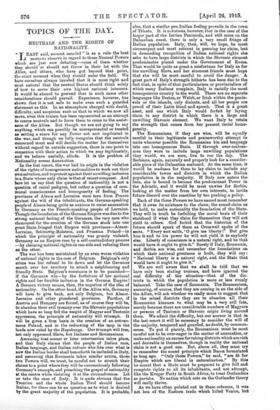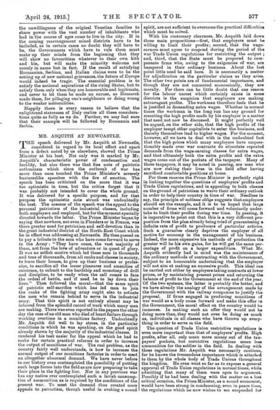TOPICS OF THE DAY.
NEUTRALS AND THE RIGHTS OF NATIONA LITT.
`T EAST said, soonest mended " is as a rule the best JJ motto to observe in regard to those Neutral Powers which are just now debating—some of them whether they should or should not throw in their lot with the Allies, and others, who have got beyond that point, the exact moment when they should enter the field. We have ourselves always insisted that it is most right and most natural that the neutral States should think solely of how to serve their own highest national interests. It would be absurd to pretend that in such cases other considerations should prevail. Experience, however, has shown that it is not safe to make even such a guarded statement as this. In an atmosphere charged with doubt, difficulty, and suspicion such as that in which we now all move, even this truism has been represented as an attempt to coerce neutrals and to force them to come to the assist- ance of the Allies. But though we are not going to say anything which can possibly be misrepresented or treated as Netting a snare for any Power not now implicated in the war, and though we fully recognize that the neutrals concerned must and will decide the matter for themselves without regard to outside suggestion, there is one point in connexion with their action to which we may legitimately, and we believe usefully, allude. It is the problem of Nationality versus Annexation.
In the last resort, the war had its origin in the violation of the rights of homogeneous nationalities to work out their own salvation,and toprotest against their unwilling inclusion ins State whose only claim is that of recent conquest. And here let us say that the question of nationality is not a question of racial pedigree, but rather a question of com- munal consciousness and homogeneity of feeling. The provinces of Alsace and Lorraine were torn from Franco against the will of the inhabitants, the German-speaking people of Alsace being quite as anxious to resist annexation by Germany as the French-speaking people of Lorraine. Though the foundation of the German Empire was due to the strong national feeling of the Germane, the very men who clamoured for the erection of the German stock into one great State fringed that Empire with provinces—Alsace- Lorraine, Schleswig-Holstein, and Prussian Poland—in which the principle of nationality was grossly violated. Germany as an Empire rose by a self-contradictory process —by claiming national rights on one aide and refusing them on the other.
The war has been maintained by an even worse violation of national rights in the case of Belgium. Belgium's only crime was her refusal to lie down and let the Germans march over her territory to attack a neighbouring and friendly State. Belgium's resistance is to be punished— if the Germans win—by the forfeiture of her national rights and her forcible inclusion in the German Empire I A German victory means, then, the negation of the idea of nationality. On the other hand, if the Allies win, Germany will have to give back, not only Belgium, but Alsace- Lorraine and other plundered provinces. Further, if Austria and Hungary are forced, as of course they will be, to abandon their evil tyranny over the Slavonic populations which have so long felt the weight of Magyar and Teutonic oppression, the principle of nationality will triumph. It will be given a firm basis in the creation of an autono- mous Poland, and in the redrawing of the map in the lands now ruled by the Hapsburgs. Our triumph will free, not only oppressed Slave, but Italians and Roumanians. Assuming that sooner or later intervention takes place, and that Italy claims that the people of Italian race, Italian language, and Italian culture who live over what is now the Italian border shall henceforth be included in Italy, and assuming that Roumania takes similar action, those two Powers will, we trust, be careful not to stretch their claims to a point where they will be unconsciously following Germany's example, and preaching the gospel of nationality at the centre while violating it at the circumference. Let us take the case of Italy. It is quite obvious that the Trentino and the whole Italian Tirol should become Italian, for there can be no question as to what is desired by the great majority of the population. It is probable., also, that a similar pro-Italian feeling prevails in the town of Trieste. It is notorious, however, that in the ease of the larger part of the Istrian Peninsula, and still more on the Dalmatian coast, there is only a very small fringe of Italian population. Italy, then, will, we hope, be most circumspect and most reticent in pressing her claim, lest in demanding recognition of Italian national rights she asks to have large districts in which the Slavonic element predominates placed under the Government of Rome, That would be quite as great a misfortune for Italy as for the unwilling Slave, and her sincerest friends must hope that she will be most careful to avoid the danger. A great part of Italy's strength hitherto has been due to the fact that, in spite of that particularism or provincialism of which many Italians complain, Italy is racially the most homogeneous country in the world. There are no separate languages like Breton, or Welsh, or Irish within the penin- sula or the islands, only dialects, and all her people are proud of their Latin blood and speech. That is a great asset, and one which Italy would forfeit by laying claim to any district in which there is a large and unwilling Slavonic element. We want Italy to retain the strength that comes from her present racial homo- geneity.
The Roumanians, if they are wise, will be equally careful in their legitimate and praiseworthy attempt to unite wherever possible the Roumanian kin and language into one homogeneous State. If through over-zealous- ness they were to include large unwilling populations they would, we are sure, live to rue the day. The Serbians, again, naturally and properly look for a consider- able piece of the Dalmatian seaboard. At the same time, it would be madness for them to lay claim to include any i considerable towns and districts in which the Italian population is in the majority. If Italy now enters the lists, she is bound to become the predominant Power in the Adriatic, and it would be most unwise for Serbia, looking at the matter from her own interests, to invite future discord over the coastline by too pushing a policy.
Each of the three Powers we have named must remember that it owes its existence to the claim, the sound claim as we hold, to make nationality the foundation of the State. They will in truth be forfeiting the moral basis of their statehood if what they claim for themselves they will not yield to others. God forbid that the historian of the future should speak of them as Cromwell spoke of the sects. "Every sect saith, • 0 give me liberty !' But give him it and to hie power he will not yield it to anybody else. Liberty of conscience is a natural right, and he that would have it ought to give it." Surely if Italy, Roumania, and Serbia are wise, and remember the foundations on which their national greatness is built, they will say: " National liberty is a natural right, and the State that would have it ought to give it."
We are well aware that we shall be told that we have only been stating truisms, and have ignored the real difficulty of the situation—that of the dis- tricts in which the population is more or less evenly balanced. Take the case of Roumania. The Roumanians, assuming, of course, that they are coming in on the side of the Allies, will ask whether we really mean to suggest that in the mixed districts they are to abandon all their Roumanian kinsmen to what may be a very evil fate, merely because there are considerable numbers of Magyars or persons of Teutonic or Slavonic origin living around them. We admit the difficulty, but our answer is that in the last resort it will be necessary to consider the will of the majority, tempered and guarded, no doubt, by common- sense. To put it plainly, the Roumanians must be most careful not to be over-eager in the matter of annexation, or make nationality an excuse for taking districts which are rich and desirable in themselves, though in reality the national claim is not a good one. But, above all, they must try to remember the sound principle which Bacon formulated so long ago. "Only those Powers," he said, "are fit for Empire which are liberal in naturalization." By this he meant that a State must be prepared to give full and complete rights to all its inhabitants, and not attempt, like the Breuer Party in South Africa, to treat Outlanders as pariahs. No nation which acts on the Outlander theory will really thrive. As we have often pointed out in these columns, it was not loss of the Eastern trade .whieh. killed- Venice, but
the unwillingness of the original Venetian families to share power with the vast number of inhabitants who bad in the course of ages come to live in the city. If in the coming rearrangement mixed districts have to be included, as in certain cases no doubt they will have to be, the Governments which have to rule them must make up their minds from the beginning that they will show no favouritism whatever to their own kith and kin, but will make the minority welcome not merely in name but in fact. If the result of satisfying Roumanian, Serbian, and Italian claims were to he the setting up of new national grievances, the future of Europe would indeed be tragic. The essential problem is to satisfy the national aspirations of the rising States, but to satisfy them only when they are honourable and legitimate, and never to let them be made an excuse, as Bismarck made them, for pillaging one's neighbours or doing wrong to the weaker nationalities.
Happily there is every reason to believe that the enlightened statesmen of Italy realize all these considera- tions quite as fully as we do. Further, we may feel sure that their example will be followed by Roumania and Serbia.















































 Previous page
Previous page